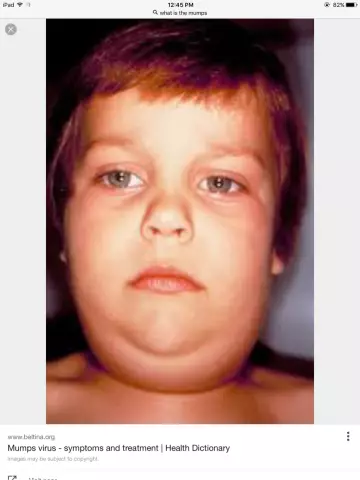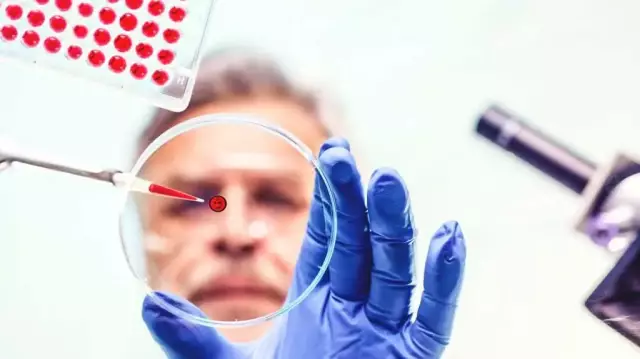- Author Rachel Wainwright [email protected].
- Public 2023-12-15 07:39.
- Last modified 2025-11-02 20:14.
Chorea
Chorea disease and its forms

Chorea belongs to a group of diseases of the nervous system. It can be provoked by various factors, for example, impaired blood circulation in the brain, viral diseases, rheumatism. Chorea often develops after prolonged use of potent drugs and after poisoning with chemicals and carbon monoxide. In pregnant women, the disease manifests itself as a result of frequent viral diseases, in particular after relapses of angina.
The manifestation of the first symptoms of chorea should alert and become a reason for being examined by a doctor. First of all, the doctor excludes rheumatism, since it is rheumatic chorea that most often affects the human body. Another form of chorea - non-rheumatic - is a rare disease that occurs as a complication of encephalitis and is fraught with paralysis and even death. Rheumatic chorea can affect children between the ages of two and six, as well as pregnant women. The non-rheumatic form of the disease manifests itself by the age of 25-30 in persons who have suffered acute infectious diseases in the past.
Senile chorea is considered a separate form. Unlike rheumatic chorea, which affects children, it affects the nervous system of people over the age of 60, and is preceded by atherosclerosis. With this form, the characteristic symptoms of chorea do not arise, the psyche practically does not suffer.
A large risk group is the children of parents who have a history of rheumatic chorea or another form of this disease. It is one of the most common hereditary diseases, and pathological changes in genes are easily transmitted from generation to generation. The hereditary form of the disease is called Huntington's chorea.
Chorea symptoms
The disease may not manifest itself immediately. But the symptoms of chorea are usually pronounced and slightly similar to manifestations of other disorders of the nervous system. The onset of an attack is characterized by weakness, the patient cannot stand, move, the muscles weaken and lose tone. The characteristic symptoms of chorea resemble quite natural movements of the face and limbs, smiles, grimaces and other facial expressions. But all this is done involuntarily and uncontrollably by a person. In severe cases, chorea in children leads to speech impairments, irreversible consequences occur in the cerebellum, which lead to impaired coordination of movements.
As for the patient's mental state, it also changes with Hinington's chorea. Memory weakens, mental activity is disturbed, attention is scattered, mood changes dramatically. Hallucinations, delusional ideas appear. Relief occurs during the patient's sleep, but, as a rule, it is difficult to fall asleep because of the symptoms of chorea.
Chorea diagnosis
To diagnose Hinington's chorea or rheumatic chorea, a series of tests are required. To prescribe the correct treatment for chorea, a patient's blood test will be required. According to its results, it is possible to determine whether the level of leukocytes is increased or decreased, as well as whether streptococcal infection is present. The blood can also detect rheumatoid causes of chorea. In the process of diagnosing Hinington's chorea, the doctor will definitely study the medical history of the parents of the sick child in order to determine whether the cause of its exacerbation is heredity.
During the examination, an electroencephalogram and a method of magnetic resonance imaging are used. Chorea in children and adults is also diagnosed with computed tomography.
Features of therapy in the treatment of chorea

Chorea treatment prescribed by the doctor must be followed exactly. The danger of some forms of the disease, in particular Hinington's chorea, is frequent relapses. Therefore, you cannot neglect the advice of doctors. It is very important, before the development of chorea in children suffering from rheumatism, to register them in a dispensary. This allows in some cases to minimize the chance of developing a severe form of chorea in children and adults.
Chorea therapy includes a number of medications. These are antipsychotics and sedatives, anti-inflammatory and antiviral agents, antihistamines and vitamins, agents for vasodilation and for improving the functioning of the brain. For severe Hnington's chorea, antibiotics are used. Additionally, in the treatment of chorea, physiotherapeutic procedures, therapeutic radon baths, and baths with pine needles are prescribed.
The effectiveness of the treatment of chorea depends on how correctly and timely the main cause of the development of this disease is identified. Doctors do not recommend planning the birth of children for people who have a family history of chorea. If symptoms of chorea appear during a woman's pregnancy, then the chances of giving birth to a healthy baby are reduced. You shouldn't plan a second pregnancy.
Parents of children with manifestations of this disease should be very careful and careful in conversations and behavior. It is impossible to provoke irritation of his nervous system with shouts and negative emotions.
YouTube video related to the article:
The information is generalized and provided for informational purposes only. At the first sign of illness, see your doctor. Self-medication is hazardous to health!






